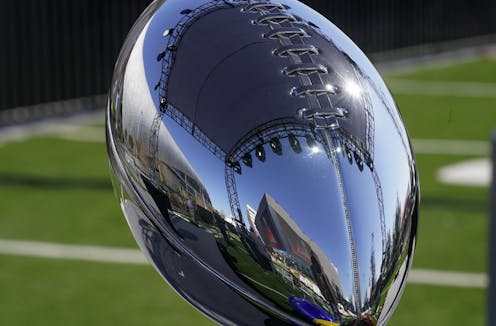What The Conversation talks about when it talks about football: 3 essential reads ahead of the Super Bowl
- Written by Matt Williams, Breaking News Editor

The Super Bowl is all about wings. Well, it’s about wings and commercials. OK, OK, it is about wings, commercials and four 15-minute quarters of broken play interspersed with moments of occasional sporting drama and a halftime singsong.
In fact, football is about all that and much more. Over the last 12 months, The Conversation has published articles on everything from race and sexuality in the NFL to how climate change may affect the game[1] in years to come.
So if this year’s Super Bowl is a little dull, or you simply want to avoid being sold a truck every commercial break, here are a few interesting reads on what is happening in the football, but off the field.
1. NFL’s abysmal record on hiring diverse coaches
Super Bowl LVI is taking place in the shadow of a controversy over racial discrimination in the the NFL. On Feb. 1, former Miami Dolphins head coach Brian Flores filed a lawsuit against three teams and the league, alleging a pattern of racist hiring practices.
To George B. Cunningham, professor of sport management at Texas A&M University, the legal development is perhaps hardly surprising. His article explores[2] the “glaring absence of nonwhite head coaches” in the NFL.
Cunningham notes that at the beginning of the 2021 season there were just three Black head coaches in the NFL – the same as there were in 2003.
This isn’t a result of performance; there is no evidence that Black coaches are less qualified or have worse results. Rather, Cunningham notes, “biased decision-making, organizational cultures that value similarity, and societal forms of bias and discrimination are all to blame for the lack of diversity among NFL head coaches.”
Read more: Almost all NFL coaches are white -- lawsuit focuses on league's abysmal record hiring diverse coaches[3]
2. An equally bad record on supporting gay athletes
Racial gaps at the top level of coaching isn’t the only disparity in American football. There is also a distinct lack of gay athletes in the sport.
In fact, the first openly gay active NFL player only came out in June 2021. The announcement, by Las Vegas Raiders defensive lineman Carl Nassib, received widespread attention and praise.
Penn State’s John Affleck writes that to “have a gay player in America’s most-watched sport represents a landmark moment” but that it does not mean “the end of homophobia in sport.”
Affleck notes the case[4] of Michael Sam, a star college football player who was projected as a fourth-round draft pick heading into 2014. But after confirming in interviews that he was gay, he slid to a sixth-round projection. Ultimately, “he was not selected until the 249th pick overall – eighth to last – in the final round of the draft,” Affleck writes.
Barriers to out athletes continue today. Affleck cites 2021 research showing that half of LGBTQ respondents to a survey said they had “experienced discrimination, insults, bullying or abuse while playing, watching or talking about sports.”
Read more: Why it's such a big deal that the NFL's Carl Nassib came out as gay[5]
3. Decision making away from the field of play
Big players made big calls during this year’s NFL season – but not all of them were right, and not all of them were on the field.
Green Bay Packers quarterback Aaron Rodgers made a call that was out of his field of expertise – and he was very, very wrong.
A few days after being diagnosed with COVID-19, Rodgers offered what USC Dornsife College of Letters, Arts and Sciences’s Joe Árvai described as[6] “a smorgasbord of pandemic misinformation and conspiracy theories” defending his decision to skip the COVID-19 vaccine.
As someone who studies how people think, Árvai was also intrigued by Rodgers’s claim that his position on vaccination was due to his being “a critical thinker.”
To Árvai, critical thinking is not “some after-the-fact justification someone makes to convince others – or themselves – that their opinions or behaviors are sound.” Rather, it is a “pattern of behaviors that happen before someone makes a judgment, like coming to the conclusion that something is risky.”
He outlines three ingredients for critical thinking:
- Acknowledging when to balance instinctive reactions with the need for a heavier psychological lift.
- Following basic principles regarding information and being willing to change your mind in response to new insights.
- Recognizing when it is time to look for experts to help.
“Unfortunately, Aaron Rodgers is far from alone when it comes to poor critical thinking,” Árvai laments.
Read more: Aaron Rodgers dropped the ball on critical thinking – with a little practice you can do better[7]
References
- ^ climate change may affect the game (theconversation.com)
- ^ article explores (theconversation.com)
- ^ Almost all NFL coaches are white -- lawsuit focuses on league's abysmal record hiring diverse coaches (theconversation.com)
- ^ notes the case (theconversation.com)
- ^ Why it's such a big deal that the NFL's Carl Nassib came out as gay (theconversation.com)
- ^ described as (theconversation.com)
- ^ Aaron Rodgers dropped the ball on critical thinking – with a little practice you can do better (theconversation.com)
Authors: Matt Williams, Breaking News Editor

